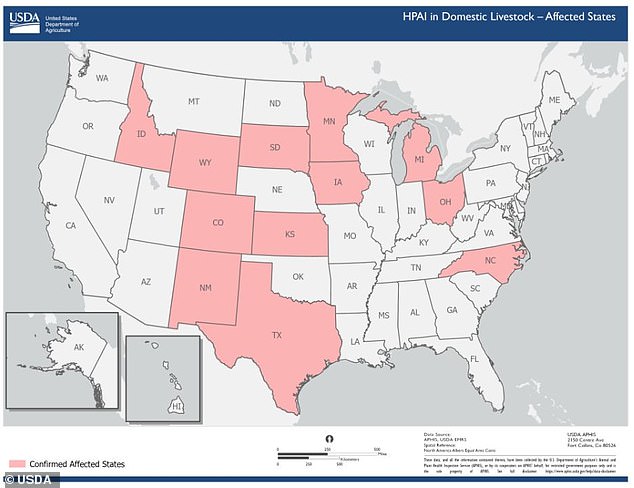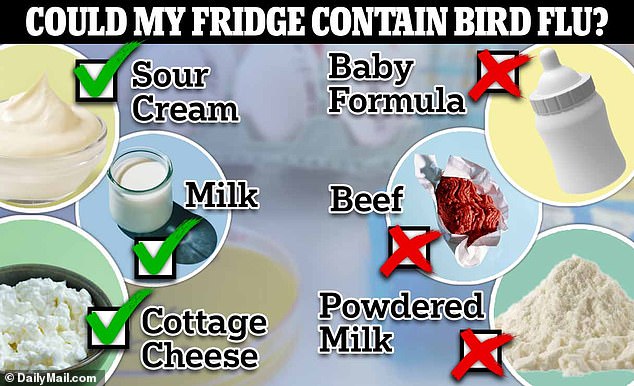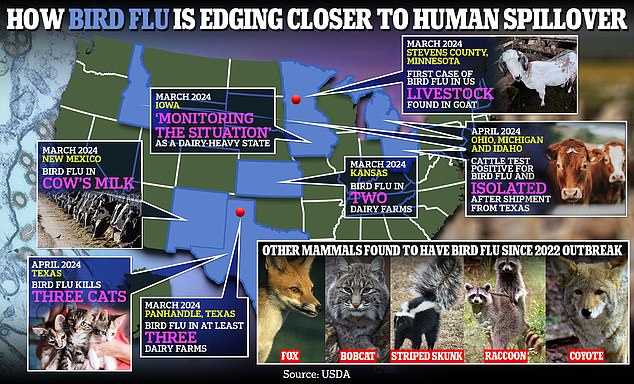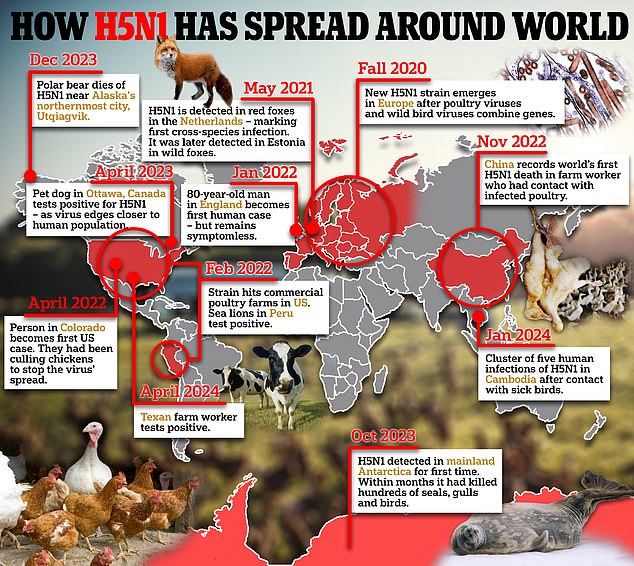The rapid spread of deadly bird flu could make it difficult to eat bacon, eggs and cheese in the morning.
This week, McDonald’s announced that restaurants in Australia will stop serving breakfast 90 minutes early as the country’s egg supply is affected by outbreaks of bird flu.
“Like many retailers, we are carefully managing egg supply due to current industry challenges,” the company said in a Facebook post Tuesday.
In the United States, the H5N1 virus is spreading from infected eggs, beef and unpasteurized milk, prompting American experts to warn of “pandemic potential.”
As the virus rages, food safety experts told DailyMail.com that the US food industry is “generally well prepared” to meet the challenge, but continued monitoring is “crucial” to maintaining that stability.
McDonald’s has not yet responded to a request for comment from DailyMail.com.
McDonald’s announced that restaurants in Australia will stop serving breakfast 90 minutes early amid egg shortages caused by bird flu outbreaks

The map above shows states where avian influenza infections in livestock have been reported.
Dr Darin Detwiler, a former food safety adviser to the FDA and USDA, told DailyMail.com: “The situation in Australia, where McDonald’s is limiting breakfast availability due to egg shortages caused by bird flu, highlights the potential vulnerabilities in food supply chains caused by disease outbreaks.”
‘While the current situation in Australia is worrying, it does not necessarily predict a similar immediate impact in the United States.’
He added: “However, it serves as a reminder of the importance of maintaining biosecurity measures and having adaptation strategies in place to deal with unexpected challenges in the food supply chain.
In Australia, bird flu has been detected in 11 poultry farms in the south-east of the country. As a result, 1.5 million birds have been culled to reduce the spread.
McDonald’s stores will now stop serving breakfast at 10:30 a.m., 90 minutes earlier than the original end time of 12 p.m.
“We are working hard with our Australian farmers and suppliers to get this back to normal as soon as possible,” the company said Tuesday.
And Australian supermarket chain Woolworth’s has announced it will limit egg sales to two packs per week. The limit applies to the regions of New South Wales, the Australian Capital Territory and Victoria.
“Along with other retailers, we expect a short-term delay in stock from one of our egg suppliers in New South Wales, ACT and Victoria, due to the temporary closure of one of their packing plants,” a Woolworths spokesperson said.
“The situation in Australia, where McDonald’s is limiting breakfast availability due to egg shortages caused by bird flu, highlights potential vulnerabilities in food supply chains caused by disease outbreaks,” Dr Detwiler said.
McDonald’s in the United States has not announced any restrictions or future menu changes to deal with the outbreak. However, bird flu has spread to both poultry and livestock.

A check mark indicates foods that tested positive for bird flu, while a cross indicates those that were tested for bird flu but were not found to contain the virus.

The above shows how bird flu is moving closer to human spread in the US.
As of July 1, more than 136 dairy herds in 12 states have been affected, according to the CDC.
Like Australia, the United States has also culled several flocks of poultry to contain the virus.
In May, officials in Sioux County, Iowa, confirmed that 4.2 million birds died after bird flu was found among the flock.
A month earlier, another 2 million birds were culled after a case of bird flu was detected at Cal-Maine Foods, the largest US egg producer.
And St. Louis-based Post Holdings said in May that bird flu outbreaks at two third-party facilities decimated Nearly 14 percent of its egg supply – around 5.7 million laying hens.
Federal health agencies have not said there is a shortage of eggs, although production has declined.
A May release from the USDA noted that egg production in April 2024 was down 1 percent compared to the same period last year, and the number of laying birds was down 2 percent.

Dr. Detwiler noted that unlike smaller countries like Australia, “the United States has a robust and diverse agricultural sector with multiple regions contributing to the supply of eggs and beef.”
“This diversification can help mitigate localized shortages. However, if a severe and widespread outbreak were to occur, it could impact the supply chain.”
He also noted that U.S. fast-food chains typically have contingency plans in place to deal with any disruptions in the supply chain, such as turning to different suppliers, removing ingredients from menus or changing portion sizes.
“One of the problems is that shrinkflation is often associated with economic decisions rather than availability issues, so sometimes consumers don’t know the real cause,” he said.
Australia is not the only country whose eggs have been hit hard by shortages related to bird flu.
In Japan, 17 million chickens were culled last season due to bird flu, or nearly one in 10 laying hens. The BBC reported.
This led to 18 companies discontinuing egg-related products last year, including McDonald’s Teritama Muffin, which uses egg, and several 7-Eleven sandwiches.
“It is reasonable to be aware and concerned about these risks, but at this time the U.S. food industry as a whole is well prepared to manage and mitigate such challenges,” said Dr. Detwiler.
‘Continued monitoring and proactive measures will be critical to ensuring stable supplies of eggs and beef.’


